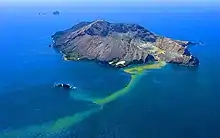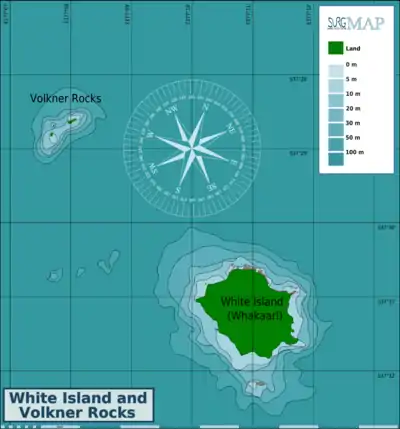

This article is intended to provide the already qualified Scuba diver with information which will help to plan dives in the waters of White Island, in the Bay of Plenty, North Island, New Zealand, whether as a local resident or a visitor. Information is provided without prejudice, and is not guaranteed accurate or complete. Use it at your own risk.
Understand
The full Māori name for the White Island is 'Te Puia o Whakaari', meaning 'The Dramatic Volcano.' It was named 'White Island' by Captain Cook on October 1, 1769 because it always appeared to be in a cloud.
White Island is in the Bay of Plenty, about 48 km (30 mi) from the coast. The nearest mainland towns are Whakatane and Tauranga. It is one of the most accessible active volcanos on earth, attracting scientists, volcanologists and tourists.
General topography
White Island is an active andesite stratovolcano. It is New Zealand’s most active cone volcano, and only active marine volcano, and has been built up by continuous volcanic activity over the past 150,000 years. The eruptions have produced both lava flows and explosive eruptions of ash.
The island is roughly circular, about 2 km (1.2 mi) in diameter, and rises to a height of 321 m (1,053 ft) above sea level. However this is only the peak of a much larger submarine mountain, which rises up to 1,600 m (5,249 ft) above the nearby seafloor, making the largest volcanic structure in New Zealand.
Climate, weather and sea conditions
Marine ecology
Equipment
Dive sites

Respect
Get help
Get service
Do
Get around
White Island is privately owned and was declared a private scenic reserve in 1953. Visitors may not land without permission or remove or disturb any wildlife. The island is easily accessible by authorised tourist operators. Weather permitting, a motor launch leaves Whakatane daily for a six-hour day trip. Helicopter and aeroplane trips are available from Rotorua, Tauranga and Whakatane.
Stay safe
White Island is an active volcano, noxious fumes may be emitted. Do not fill cylinders downwind of the island.
See
Breeding colony of about 3000 pairs of Australasian Gannets on the island.